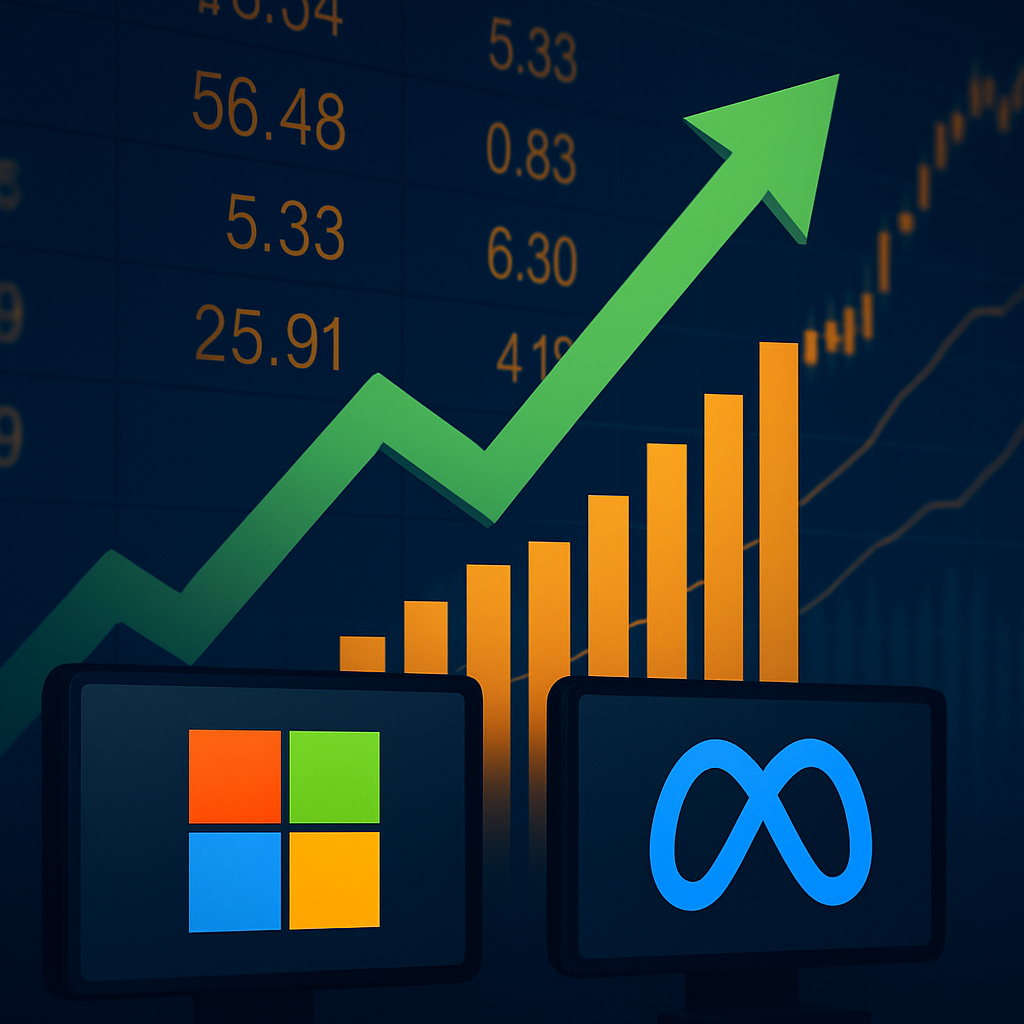Surging earnings from two of tech’s biggest names—Microsoft and Meta Platforms—have reignited bullish momentum in U.S. equity markets, sending futures tied to the S&P 500 and Nasdaq to all-time highs. The post-earnings optimism underscores a broader investor belief that mega-cap tech firms remain the central engine of market growth, driven by AI-fueled cloud infrastructure and digital advertising expansion.
This earnings season has already become a defining moment for investors navigating richly valued markets. With Microsoft and Meta outperforming analyst estimates, the tech-led rally is both a vote of confidence in innovation—and a warning sign of a potentially overextended market.
Earnings that Moved the Market
Microsoft (MSFT) reported Q2 revenue of $66.9 billion, exceeding estimates with net income surging 23% to $22.6 billion. Notably, its cloud segment Azure posted a 25% year-over-year revenue increase, underpinned by robust enterprise AI integration and continued demand for generative AI solutions.
Meta (META) followed suit with Q2 revenues of $39.1 billion, a 16% jump year-over-year, driven by strength in digital advertising and AI-powered content delivery. The company also announced a $50 billion share buyback, further boosting investor sentiment.
According to Reuters, these results pushed Nasdaq futures up over 1.2% and S&P 500 futures by 0.8% in early morning trading. The earnings momentum came despite Fed Chair Jerome Powell’s latest comments hinting at a “data-dependent” stance on future rate cuts.
“The strong beat by Microsoft and Meta shows AI is not just hype—it’s revenue,” said Dan Ives, Managing Director at Wedbush Securities. “Wall Street is rewarding execution, and right now, big tech is delivering.”
Why This Matters for Investors
The recent spike in mega-cap tech valuations is more than a temporary earnings bounce—it’s a reaffirmation that AI, cloud, and platform-based business models are delivering tangible growth and profitability. Microsoft and Meta’s combined market capitalization now exceeds $6 trillion, and their influence on index movements is profound.
With the top seven U.S. tech companies now accounting for nearly 30% of the S&P 500’s total weight, according to Bloomberg data, their performance holds outsized influence over institutional portfolios and ETF exposure.
But there’s growing tension between growth optimism and valuation concerns. Microsoft’s price-to-earnings ratio now hovers around 36x forward earnings, and Meta trades at over 30x, well above historical averages for the S&P 500.
“We’re reaching a point where execution has to remain flawless,” said Savita Subramanian, Head of U.S. Equity Strategy at Bank of America. “There’s very little room for disappointment in names trading at these multiples.”
Future Trends to Watch
- AI Monetization Acceleration: Microsoft’s integration of Copilot into Office 365 and Meta’s AI-driven advertising are early examples of how generative AI is translating into revenue.
- Capex Expansion: Microsoft disclosed over $30 billion in capital expenditures this year—primarily aimed at AI data centers. This aligns with Morgan Stanley’s forecast of a $3 trillion global data center boom by 2028, cited by the Financial Times today.
- Broader Market Fragility: While mega-caps rally, small- and mid-cap tech remains mixed. Investors should monitor market breadth indicators for signs of unsustainable concentration.
- Interest Rate Sensitivity: As AI-related demand fuels earnings, investors must weigh potential drag from delayed rate cuts or sticky inflation, which could compress multiples.
Key Investment Insight
Investors holding broad exposure to mega-cap tech are likely to benefit in the short term, but concentration risk is rising. Consider diversifying into high-quality mid-cap names or thematic ETFs focusing on AI infrastructure, semiconductors, and edge computing. Additionally, keep an eye on balance sheets—firms with strong free cash flow and modest debt will outperform if macro volatility returns.
For value-oriented investors, the earnings surge is a reminder to stay selective. Not all AI players will monetize effectively or scale like Microsoft or Meta. Look for firms with real use cases, strong margins, and disciplined capital allocation.
Stay ahead of the curve with MoneyNews.Today—your daily source for trusted financial insights, market trends, and actionable investor intelligence.





